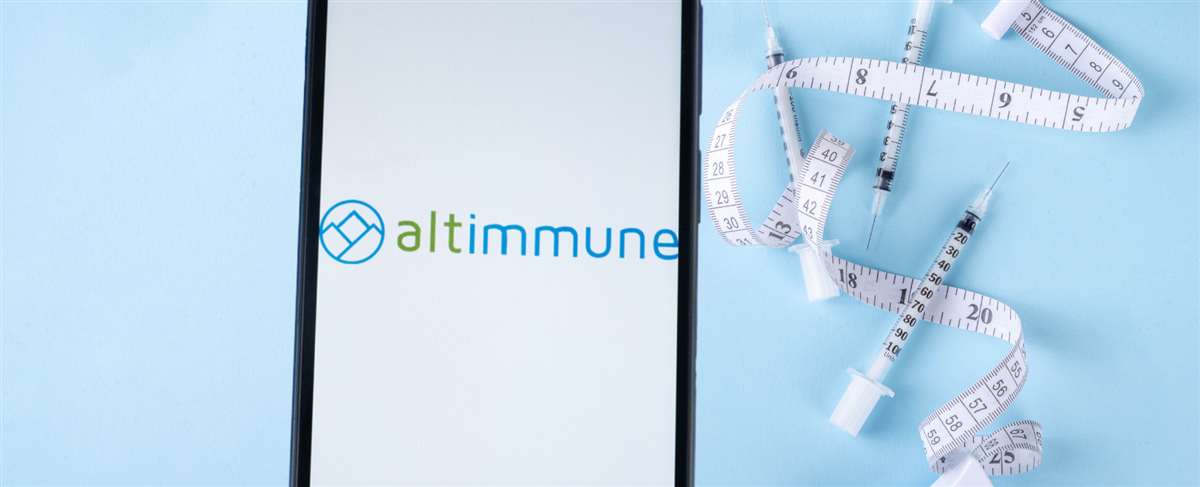
As pharma giants Eli Lilly (NYSE: LLY) and Novo Nordisk (NYSE: NVO) are raking in the cash from their weight loss and diabetes drugs, many other companies want a piece of the pie. They’re developing treatments to improve upon the deficiencies of Lilly and Novo’s drugs.
One company to keep an eye on in this space is Altimmune (NASDAQ: ALT). But what makes Altimmune's drug different from existing drugs, and what kind of market opportunity does it have?
Altimmune's leading drug candidate is pemvidutide. The drug is being studied for two conditions: obesity and metabolic dysfunction-associated steatohepatitis (MASH). MASH is a severe liver disease that is often associated with obesity. However, I'll focus my analysis on pemvidutide’s prospects in the overall obesity market.
Pemvidutide Looks to Solve a Key GLP-1 Problem: Muscle Loss
One of the main value adds that Altimmune is trying to provide over what is currently available with pemvidutide is the preservation of lean muscle mass. In general, when losing weight, people often lose both fat and muscle. However, it seems this happens disproportionately when weight loss comes from calorie restriction. This is the method GLP-1s allow through appetite reduction.
An excessive reduction in lean body mass can cause adverse effects such as a decline in metabolic health, as well as bone density loss. This can lead to sarcopenia, which increases the risk of bone fractures. It is especially concerning in older individuals, as bone density also naturally falls with age. Compared to men, women over the age of 50 are four times as likely to suffer from osteoporosis, which regularly occurs simultaneously with sarcopenia. This leaves them particularly at risk of the adverse effects of a reduction in lean muscle mass that GLP-1’s can exacerbate. Women nearing or over 50 could likely benefit the most from weight loss drugs that minimize lean muscle mass loss.
A Big Portion of GLP-1 Users Could Potentially Benefit
Data from Blue Cross Blue Shield shows that 80% of patients who took GLP-1s for weight management from 2013 to 2024 were women. Additionally, nearly 84% of all patients were 35 or older. Those between the ages of 55 and 65 also significantly outnumbered those aged 18 to 34. National Center for Health Statistics data shows that people over 40 suffer obesity at higher rates than those between the ages of 20 and 39.
Given that GLP-1 users skew over 35 years or older and are the majority women, it's reasonable to assume that a very significant number of GLP-1 patients are women 50 or older.
To me, this signals that a company like Altimmune could be set up very nicely to capitalize on this large customer base that could benefit most from its products. Additionally, the market isn’t just confined to women over 50, the drug could benefit other patients too. However, this assumes it works better than the competition.
Analyzing Pemvidutide’s Clinical Results Versus Lilly and Novo’s Blockbusters
So, how do pemvidutide’s lean muscle loss and overall weight loss results stack up with those of available medications? Healthcare provider Baton Rouge General cites two different studies relating to lean muscle mass loss. With semaglutide, the clinical name for Novo Nordisk’s Wegovy and Ozempic, 39% of the weight patients lost was lean muscle. For tirzepatide, the clinical name for Eli Lilly’s Mounjaro and Zepbound, the number dropped to 25%. Pemvidutide’s latest results show improvement over those figures, at just 22%. The company described this as “class-leading." Additionally, when looking at patients over 60, the number dropped to 20%. This is a particularly impressive signal that could lead doctors to prescribe the drug to older individuals over current treatments.
It induced an average overall weight loss of 15.6% over 48 weeks, similar to what semaglutide achieved. However, it falls short of tirzepatide, which showed an average weight loss of +20% over the same period.
In my mind, these results and the large potential market opportunity for pemvidutide make Altimmune a key company to watch in the weight loss drug market. Altimmune has successfully completed Phase 2 trials for pemvidutide in obesity and received FDA approval to proceed with Phase 3 trials. While still a high-risk investment, the advancement to Phase 3 suggests strong potential; if pemvidutide passes this final stage and gains full FDA approval, Altimmune could have a major revenue driver on its hands. Currently, Wall Street is projecting a 157% upside in the stock on average.

